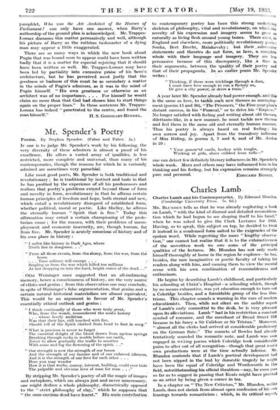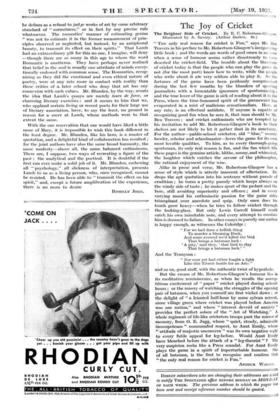Charles Lamb - -
Charles Lamb and his Contemporaries. By Edmund Blundon. (Cambridge University Press. 7s. 6d.) Ma. BLUNDEN tells us that he was already cogitating a book on Lamb, " with the kind of diurnal and detailed reconsidera- tion which he had begun to see shaping itself to his hand," when he was asked to give the Clark Lectures for 1932. Having, so to speak, this subject on tap, he decided to treat it instead in a condensed form suited to the exigencies of the spoken word. While regretting 'the more " lengthy observa- tion," one cannot but realize that it is to the exhAustiveness of the unwritten work we owe some of the principal qualities of the lectures. Mr. 13Iunden has not only made himself thoroughly at home in the region he explores—he has, besides, the rare imaginative or poetic faculty of taking his readers along with him, and causing them to view the mental scene with his own combination of reasonableness and enthusiasm.
He begins by describing Lamb's childhood, and particularly his schooling at Christ's Hospital—a schooling which, though by no means exhaustive, was yet education enough to turn out a Coleridge besides, and a formidable group of the less illus- trious. This chapter sounds a warning in the ears of modern educationists. Then, while not silent on the sadder aspect of Lamb's early committal to the desk, he is very pleasant upon its alleviations. Lamb " had in his restriction a constant symbol of romance, and the merchant of Bread Street became in his fancy a Sir Calidore or Sir Tristan." Moreover, " almost all the clerks had arrived at considerable proficiency on the German flute." The sonnets of Bowles had already tentatively sounded the romantic note, and Lamb was soon engaged in writing poems which Coleridge took considerable pains to alter out of all recognition—though that great man's own productions were at the time actually inferior. Mr. Blundell. contends that if Lamb's poetical development had not been nipped in the bud by domestic tragedy he might have been the equal of Coleridge and Wordsworth in this field, notwithstanding his official thraldom—nay, he even goes so far as to suggest in passing that Keats might have profited as an artist by being given a corner in tea.
In a chapter on " The New Criticism," Mr. Minden, unlike Lamb, does not shrink from almost open confession of his own leanings towards romanticism : which, in its critical aspect, he defines as a refusal to judge works of art by some arbitrary standard of " correctness," or in fact by any precise rule whatsoever. The romantics' manner of estimating genius " was not to estimate it in the former measurement of prin- ciples observed or neglected, but instead, by an antiphonal beauty, to transmit its effect on their spirits." That Lamb had an extraordinary gift for this no one, I imagine, will deny —though there are so many in this age to whom the word Romantic is anathema. They have perhaps never realized that belief in the soutis usually oneottribute of minds excep- tionally endowed with.conunon sense. The Romantics, recog- nizing as they did the emotional and even ethical nature of poetry, were at any rate more in contact with reality than those critics of a. later school who deny that art has any connexion with such values. Mr. Blunden, by the way, scouts the idea that Lamb's Issays are merely tours de force, or charming literary exercises : and it occurs to him that we, who applaud certain living or recent poets for their large use of literary association, have, to say the least, no ground in reason for a sneer at Lamb, whose methods were to that extent the same.
With the one reservation that one would have liked a little more of Mary, it is impossible to wish this book different in the least degree. Mr. Blunden, like his hero, is a master of quotation, and a delightful kind of collaboration has resulted : for the joint authors have also the same broad humanity, the same modesty—above all, the - same balanced enthusiasms. There are, I suppose, two ways of recreating a figure of the past : the analytical and the poetical. It is doubtful if the first can ever make a solid job of it. Mr. Blunden, eschewing all " psychology," all slickness of interpretation, presents Lamb to us as a living person, who, once recognized, cannot be resisted. He has been able to " transmit the effect on his spirit," and, except a future amplification of the experience, there is no more to desire.
ROMILLY JOHN.















































 Previous page
Previous page